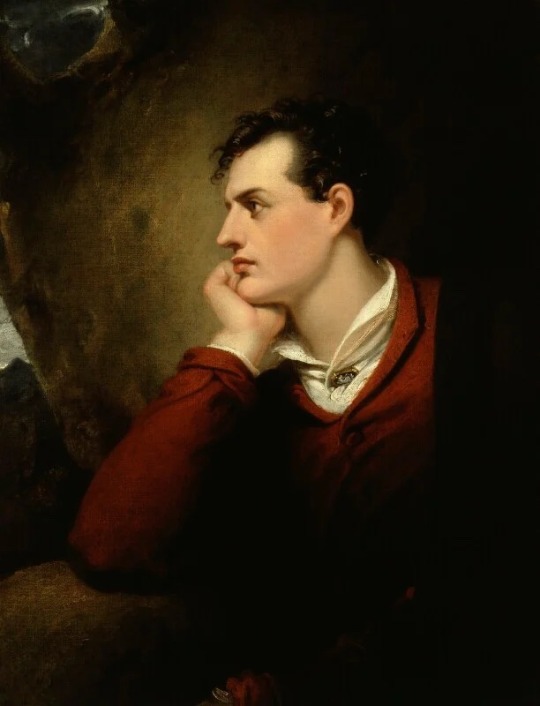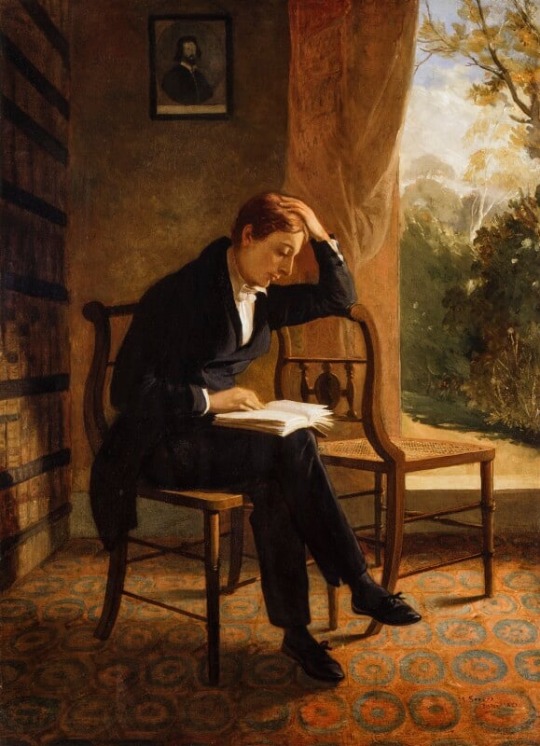#contrary to stereotypes byron wasn’t always like this - he just rly hated keats’ poetry
Text
Every Instance of Lord Byron Hating On John Keats, Listed in Chronological Order.
“No more Keats I entreat — flay him alive. If some of you don’t I must skin him myself.”


To his publisher John Murray, 12 October 1820:
“‘I’m thankful for your books dear Murray / But why not send Scott’s Monastery?’ the only book in four living volumes I would give a baioccho to see, abating the rest of the same author, and an occasional Edinburgh & Quarterly – as brief Chroniclers of the times. — Instead of this – here are John Keats’s piss a bed poetry – and three novels by God knows whom [..] Pray send me no more poetry but what is rare and decidedly good. — There is such a trash of Keats and the like upon my tables – that I am ashamed to look at them. [..] – I am in a very fierce humour at not having Scott’s Monastery. – You are too liberal in quantity and somewhat careless of the quality of your missives. – [..] No more Keats I entreat – – – flay him alive – if some of you don’t I must skin him myself. There is no bearing the drivelling idiotism of the Mankin. – – – – – [editor’s note: ‘dashes degenerate into scrawl’]”
To his publisher John Murray, 4 November 1820:
“They Support Pope I see in the Quarterly. [Let them] Continue to do so – it is a Sin & a Shame and a damnation – to think that Pope!! should require it – but he does. – – – Those miserable mountebanks of the day – the poets – disgrace themselves – and deny God – in running down Pope – the most faultless of Poets, and almost of men – – the Edinburgh praises Jack Keats or Ketch or whatever his names are; – why his is the Onanism of Poetry — something like the Pleasure an Italian fiddler extracted out of being suspended daily by a Street Walker in Drury Lane – this went on for some weeks – at last the Girl – went to get a pint of Gin – met another, chatted too long – and Cornelli was hanged outright before she returned. Such like is the trash they praise – and such will be the end of the outstretched poesy of this miserable Self-polluter of the human Mind [editor’s note: ‘untranscribable scrawl’]. W. Scott’s Monastery just arrived — many thanks for that Grand Desideratun of the last Six Months.”
Note: “onanism” refers to masturbation.
To his publisher John Murray, 9 November 1820:
“Mr. Keats whose poetry you enquire after — appears to me what I have already said; such writing is a sort of mental masturbation — he is always frigging his Imagination. I don’t mean that he is indecent, but viciously soliciting his own ideas into a state which is neither poetry nor any thing else but a Bedlam vision produced by raw pork and opium.”
Note: “frigging” was slang for masturbation.
To his publisher John Murray, 18 November 1820:
“P.S. — Of the praises of that little dirty blackguard Keates in the Edinburgh — I shall observe as Johnson did when Sheridan the actor got a pension. ‘What has he got a pension? then it is time that I should give up mine!’ — Nobody could be prouder of the praises of the Edinburgh than I was — or more alive to their censure — as I showed in English Bards and Scotch Reviewers — at present all the men they have ever praised are degraded by that insane article. — Why don't they review & praise ‘Solomon's Guide to Health’ it is better sense — and as much poetry as Johnny Keates.”
To his publisher John Murray 26 April 1821:
“Is it true – what Shelley writes me that poor John Keats died at Rome of the Quarterly Review? I am very sorry for it – though I think he took the wrong line as a poet – and was spoilt by Cockneyfying and Surburbing – and versifying Tooke’s Pantheon and Lempriere’s Dictionary. I know by experience that a savage review is Hemlock to a sucking author – and the one on me – (which produced the English Bards &c.) knocked me down – but I got up again. Instead of bursting a blood-vessel – I drank three bottles of Claret – and began an answer – finding that there was nothing in the Article for which I could lawfully knock Jeffrey on the head in an honourable way. However I would not be the person who wrote the homicidal article – for all the honour & glory in the World, – though I by no means approve of that School of Scribbling – which it treats upon.”
To Percy Shelley, 26 April 1821:
“I am very sorry to hear what you say of Keats — is it actually true? I did not think criticism had been so killing. Though I differ from you essentially in your estimate of his performances, I so much abhor all unnecessary pain, that I would rather he had been seated on the highest peak of Parnassus than have perished in such a manner. Poor fellow! though with such inordinate self-love he would probably have not been very happy. I read the review of ‘Endymion’ in the Quarterly. It was severe, — but surely not so severe as many reviews in that and other journals upon others.
I recollect the effect on me of the Edinburgh on my first poem; it was rage, and resistance, and redress — but not despondency nor despair. I grant that those are not amiable feelings; but, in this world of bustle and broil, and especially in the career of writing, a man should calculate upon his powers of resistance before he goes into the arena. ‘Expect not life from pain nor danger free, Nor deem the doom of man reversed for thee.’
You know my opinion of that second-hand school of poetry. You also know my high opinion of your own poetry, — because it is of no school. [..] I have published a pamphlet on the Pope controversy, which you will not like. Had I known that Keats was dead — or that he was alive and so sensitive — I should have omitted some remarks upon his poetry, to which I was provoked by his attack upon Pope, and my disapprobation of his own style of writing.”
To Percy Shelley, 30 July 1821:
[First page missing] “The impression of Hyperion upon my mind was – that it was the best of his works. Who is to be his editor? It is strange that Southey who attacks the reviewers so sharply in his Kirk White – calling theirs ‘the ungentle craft’ – should be perhaps the killer of Keats. Kirke White was nearly extinguished in the same way – by a paragraph or two in ‘the Monthly’ – Such inordinate sense of censure is surely incompatible with great exertion – have not all known writers been the subject thereof?”
To his publisher John Murray 30 July 1821:
“Are you aware that Shelley has written an Elegy on Keats, and accuses the Quarterly of killing him?
‘Who killed John Keats? / ‘I,’ says the Quarterly, / So savage and Tartarly; / ‘Twas one of my feats.’ / Who shot the arrow? / ‘The poet-priest Milman / (So ready to kill man), / Or Southey or Barrow.’’
You know very well that I did not approve of Keats’s poetry, or principles of poetry, or of his abuse of Pope; but, as he is dead, omit all that is said about him in any M.S.S. of mine, or publication. His Hyperion is a fine monument, and will keep his name. I do not envy the man who wrote the article; — you Review people have no more right to kill than any other footpads. However, he who would die of an article in a Review would probably have died of something else equally trivial. The same thing nearly happened to Kirke White, who died afterwards of a consumption.”
4 August 1821, to his publisher John Murray:
“You must however omit the whole of the observations against the Suburban School – they are meant against Keats and I cannot war with the dead – particularly those already killed by Criticism. Recollect to omit all that portion in any case.”
To his publisher John Murray, 7 August 1821:
“All the part about the Suburb School must be omitted – as it referred to poor Keats now slain by the Quarterly Review — [..] I have just been turning over the homicide review of J. Keats. – It is harsh certainly and contemptuous but not more so than what I recollect of the Edinburgh R. of ‘the Hours of Idleness’ in 1808. The Reviewer allows him ‘a degree of talent which deserves to be put in the right way’ ‘rays of fancy’ ‘gleams of Genius’ and ‘powers of language’. – It is harder on L. Hunt than upon Keats & professes fairly to review only one book of his poem. – Altogether – though very provoking it was hardly so bitter as to kill unless there was a morbid feeling previously in his system.”
To Thomas Moore, August 27th 1822:
“It was not a Bible that was found in Shelley's pocket, but John Keats's poems.”
From his poem Don Juan Canto Eleventh written October 1822 and published August 1823. He was going off the popular gossip shared to him by Shelley (who believed it), which was that Keats health had sharply declined due to receiving bad reviews:
“John Keats, who was killed off by one critique, / Just as he really promised something great, / If not intelligible, without Greek / Contrived to talk about the Gods of late, / Much as they might have been supposed to speak. / Poor fellow! His was an untoward fate; / ‘Tis strange the mind, that very fiery particle, / Should let itself be snuffed out by an article.”
To his publisher John Murray, 25 December 1822:
“As to any community of feeling, thought, or opinion, between Leigh Hunt and me, there is little or none. We meet rarely, hardly ever; but I think him a good-principled and able man, and must do as I would be done by. I do not know what world he has lived in – but I have lived in three or four – and none of them like his Keats and Kangaroo terra incognita – Alas! poor Shelley! – how he would have laughed – had he lived, and how we used to laugh now & then – at various things – which are grave in the Suburbs. You are all mistaken about Shelley – – you do not know – how mild – how tolerant – how good he was in Society – and as perfect a Gentleman as ever crossed a drawing room; – when he liked – & where he liked. – – – – –“
The excerpts above are taken primarily from Peter Cochran’s transcriptions.
#contrary to stereotypes byron wasn’t always like this - he just rly hated keats’ poetry#literature#english literature#dark academia#lord byron#romanticism#poetry#history#writing#john keats#letters#journals#interesting#1800s#regency era#19th century#english#books#bookblr#authors#writers#gothic literature#romantic literature#romantic poets#keats#byron#feuds#literary history#quotes#excerpts
107 notes
·
View notes